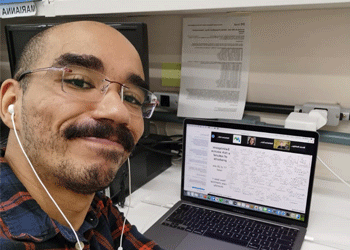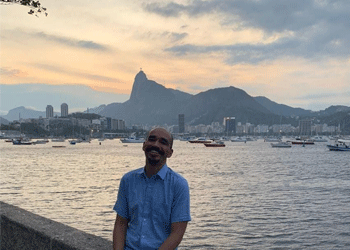LGBTQ+ STEM Day 2021: Bruno Francesco Rodrigues de Oliveira

Could you tell me a bit more about yourself?
My name is Bruno Francesco, I’m a 29-year-old cis gay man and a marine bacteriologist. I am a postdoctoral researcher at the Institute of Microbiology Paulo de Góes, Federal University of Rio de Janeiro in Brazil. When I’m not freaking out about the demands of the academic world, I enjoy walking, reading science and political history books, watching TV, and hanging out with my friends (at home mostly in these pandemic times).
It’s LGBTQ+ STEM Day on 18 November, are you doing anything this year to raise awareness?
As well as sharing posts on Twitter and Instagram about the importance of LGBTQ+ STEM Day, I plan to establish initiatives in order to raise awareness of LGBTQ+ microbiologists in the near future. With these steps, we can build a strategy to promote LGBTQ+ STEM Day here in Brazil, where I feel that it’s not so well known.
How did you feel about going into academia as someone who is openly part of the LGBTQ+ community?
When I was an undergraduate trainee in a research lab, I’d decided that “this is not relevant in my work or academic career, so there’s no point to bring it up". Part of this feeling came from the assumption that personal and academic life shouldn’t be mixed up. However, the truth was that it was too hurtful to imagine the judgment and prejudice as someone who wasn’t completely comfortable with his own sexuality at that time. I was raised most of my life in a conservative Brazilian state; the intolerant environment added to my fears, until I realised that there is nothing wrong with my sexuality. Thankfully, I’ve accepted myself for quite some time and things have evolved significantly compared to 12 years ago. I won’t lie that I still have an initial embarrassment when I openly declare myself as a gay man (especially to straight people) in academia, but I don’t feel this affects or will affect my research prospects. Now, I make sure to reaffirm, whenever possible, my role as a scientist of the LGBTQ+ community, to naturalise that for me and others.
Do you think the STEM community is becoming more open to talking about issues affecting people identifying as LGBTQ+?
The LGBTQ+STEM community is doing a remarkable job in highlighting the obstacles LGBTQ+ scientists can face during their academic careers. As a millennial, I can also clearly see that people starting their scientific career now need more decisive attitudes on the importance of discussing the prejudice, discomfort, harassment, and difficulties that members of the LGBTQ+ STEM community face, which can be compounded when LGBTQ+ people are marginalised in other intersecting ways. I see that in Brazil, there is a long way to go ‘in loco’, in other words, within university corridors, labs, classrooms and conferences; and LGBTQ+ people deserve to feel safe in the academic world. Some strategies to change this include forming safe communities to discuss these issues at university, raising awareness of the subject with scientists via events, and demanding more incisive actions when any hint of prejudice is perceived.
Could you tell us a little about your studies and/or work experience?

I am a biomedical scientist specialising in bacteriology and microbial biotechnology. By the end of my Master’s degree, I fell in love with marine bacteria and their biotechnological applications. This led me to Rio de Janeiro, where I developed my PhD thesis on sponge microbiology. I investigated the microbiota associated with a new sponge species described in the Brazilian Southeast coast. Then I moved on to mining the genomes of the cultivable sponge-associated bacteria for industrial biocatalysts, in particular carbohydrate-active enzymes (CAZymes) involved with the degradation of marine polysaccharides, such as agar, alginate and carrageenan. This part of my PhD work was carried out during my 14-month stay at University College Cork (UCC) in Ireland, where I met the incredible work of the Microbiology Society . After finishing my PhD at the end of November 2020, I became a postdoc in the same research group I performed my PhD in. Now I am improving my bioinformatic skills in bacterial genomics, to unveil relevant traits in these sponge symbiotic bacteria from both ecophysiological and biotechnological perspectives. Marine bacteria are just the best!
If you hadn’t gone into science, what career path would you have chosen?
I’d likely be a journalist. I’ve always loved to write about what moves or fascinates me. At some point, I considered being a historian, but I’d be too talkative and boring. Regardless, I can’t see myself doing anything other than running lab experiments or analysing microbial genomic data. Despite all the odds, being a scientist has made me discover the best part of myself and I couldn’t be happier.
What advice would you give to someone considering coming out while in STEM/considering going into STEM?
First of all, take your time in coming out. Don’t rush it because someone or something is urging you to. The closet is a suffocating place, but it takes courage, patience and a boost of self-esteem to leave it once and for all. Secondly, at the lab or at classes, take a closer look at the people you feel comfortable to open up to about your sexuality. Believe me, there will be a colleague or a friend to assure you that there’s nothing wrong with being who you are. I’ve been lucky to work in LGBTQ+ friendly labs during my academic career. This has absolutely contributed to strengthening me at moments where I was feeling afraid of being open.
Do you think LGBTQ+ students get enough support in universities?
No, particularly in the case of transgender students. We should all fight for trans rights because it’s the right thing to do. We also need to provide role models, so that LGBTQ+ students get the support they need. This can be life-changing; it is empowering for people from any underrepresented minority to see a person like them occupying a position of authority.
Could you tell us why you have decided to join the Society and become a Champion?
I joined the Society in November 2019, when I submitted an abstract to the Microbiology Society’s Annual Conference 2020, which was unfortunately cancelled due to the pandemic. It was the first society I joined and I was amazed by the plethora of funding and networking opportunities available to Society members. Since I became a Champion, I’ve been involved with several Society activities, and it has been an amazing experience to develop my outreach skills. I was lucky enough that one of the first Society Champions, Marilia de Assis, is Brazilian and together we created an Instagram profile, in order to promote the Microbiology Society in our country. I hope to continue to promote the work of LGBTQ+ microbiologists. We need these initiatives to change and set the scene for a more diverse and respectful scientific world.
What would you tell someone who is considering joining the Society?
Just go for it! It’s rewarding because of all the funding opportunities, including grants for participation in scientific events and travel for short stays in European research institutions, to name a few. The networking potential is extremely valuable. I’d never imagined that I’d be co-chairing a session at Annual Conference Online 2021 with the star researchers I’ve been dreaming to meet since the start of my academic career. I’m proud to say that I belong to such a committed and engaged scientific Society.
If you would like to get more involved with Society activities, or become a Society Champion, you can find out more via our Get Involved webpage.
Image: iStock/WhataWin
